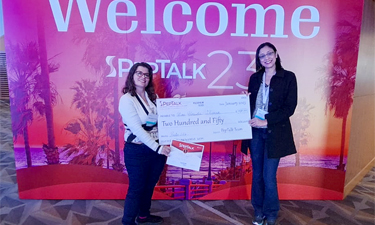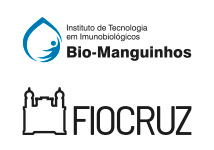 Bio-Manguinhos/Fiocruz participated in PepTalk2023 – The Protein Science and Production Week, an event that took place from January 16 to 20, in San Diego, United States. Representing the Institute and presenting posters - the only ones in Brazil - were Fiocruz Public Health Technologists Aline Almeida and Diana Praia. The two posters that were selected presented the results of the prospecting work that has been carried out in Bio-Manguinhos/Fiocruz. The poster presented by Aline, “The landscape of neutralizing monoclonal antibodies (mAbs) for treatment and prevention of COVID-19 after 2 years of the pandemic”, won the prize for best poster at Pep Talk 2023 and received US$ 250.00 as award in addition to the certificate. The poster presented by Diana, “Technology Foresight for the Identification of New Targets, Opportunities, and Partnerships for Vaccines and Biotherapeutics in Plant-Based Platforms”, was selected for oral presentation.
Bio-Manguinhos/Fiocruz participated in PepTalk2023 – The Protein Science and Production Week, an event that took place from January 16 to 20, in San Diego, United States. Representing the Institute and presenting posters - the only ones in Brazil - were Fiocruz Public Health Technologists Aline Almeida and Diana Praia. The two posters that were selected presented the results of the prospecting work that has been carried out in Bio-Manguinhos/Fiocruz. The poster presented by Aline, “The landscape of neutralizing monoclonal antibodies (mAbs) for treatment and prevention of COVID-19 after 2 years of the pandemic”, won the prize for best poster at Pep Talk 2023 and received US$ 250.00 as award in addition to the certificate. The poster presented by Diana, “Technology Foresight for the Identification of New Targets, Opportunities, and Partnerships for Vaccines and Biotherapeutics in Plant-Based Platforms”, was selected for oral presentation.
PepTalk connects protein science researchers around the world to share case studies, groundbreaking data, discoveries and solutions that support and improve biopharmaceutical Research and Development (R&D). This year's event features world-renowned speakers, cutting-edge technologies and engaging networking events. Programming includes in-depth coverage of antibody discovery, protein engineering, bispecific antibodies, emerging immunotherapies, protein aggregation, machine learning, cell and gene therapy, protein expression, purification and production.
Diana Praia is a pharmacist, with a master's degree in immunobiological technology from MPTI/Bio-Manguinhos. She is also a professor of the technical course in biotechnology at the Polytechnic School of Health Joaquim Venâncio (EPSJV/Fiocruz). She has been working at Bio-Manguinhos for 15 years and has already worked in the institute's R&D and quality control area. Aline Oliveira has been working at Bio-Manguinhos since 2008, holds a master's and doctorate in oncology from INCA and has around 15 years of experience with the development of biopharmaceuticals, having been R&D project manager and manager of the Biopharmaceuticals Program at Bio-Manguinhos.
Now they are members of the Institute's Competitive Intelligence Advisory (Aicom, in Portuguese) team and have been dedicated to prospective studies in the biopharmaceutical industry. The poster presented by Diana addressed the results of the technological monitoring on plant platforms that has been carried out since 2018. Aline, in her poster, addressed the results of prospecting for drugs for COVID-19 started in March 2020 with an emphasis on neutralizing antibodies. The two posters are the result of collaborative work that has been developed internally, bringing together specialists from different areas as part of an internal prospecting network managed by Aicom.
Aline said that the work she presented discussed the future of anti-SARS-CoV2 neutralizing antibodies. “The main question was whether it makes sense to continue investing in this technology in the current scenario of vaccine coverage and the emergence of variants. We respond through technological prospecting tools – which are being implemented at Aicom, a team of which I am part as a specialist in the area of biopharmaceuticals – working mainly with data mining and analysis, review of the literature and international guides for the treatment of COVID-19. We concluded that it would continue to be a relevant treatment for patients who do not respond to vaccination and suggesting the importance of investing in improving technology, especially in neutralizing antibodies with a broad response to variants ”, she detailed.
For her, this event represented a great learning opportunity and exchange of experiences when discussing this work and technological trends, and which will contribute to the revision of the Bio-Manguinhos roadmap. This is a result of the collaborative network established during the pandemic, bringing together people from different areas of Bio-Manguinhos in: Prospecting Working Group and Discussion Group on Biological Medicines for COVID-19, the latter of which I acted as leader. In addition, it demonstrated how prospecting can be used to aid decision-making in pharmaceutical industries and research institutions. Shortly after the event, the work was also accepted by the Journal of Pharmaceuticals Innovation for publication.
Diana highlighted that her work aimed to compare the scenario before and after the COVID-19 pandemic for vaccines and biopharmaceuticals developed on a plant platform. “To answer this question, I showed the advantages of the platform, the reason why this system was chosen for our technological prospecting study and what tools were used. We highlight, in both scenarios, that most products are under development for infectious diseases using the transient expression system, and that biosimilar medicines were the preferred R&D strategy for companies in this area. For human use, a biopharmaceutical was approved in the scenario before the pandemic and a vaccine for COVID-19 in the current scenario. We concluded that the plant platform has been used in the development of vaccines and biopharmaceuticals and that technological prospecting is a fundamental process to assist the organization's decision-making for target selection and project prioritization,” she summarized. She said that her participation in this event was essential to disseminate the institution's technological prospecting potential and present trends in plant platforms that permeated discussions with specialists from major universities and international biopharmaceutical industries.
The collaborators Beatriz Fialho (Aicom); Ana Andrade (Immunological Technology Laboratory - Latin); Amanda Marques (Clinical Advice - Asclin); Luciana Madeira (Macromolecules Laboratory - Lamam); Jose Procopio and Ivna da Silveira (Recombinant Technology Laboratory - Later) also participate in this project.
Journalist: Gabriella Ponte
Translation: Thais Christ
Image: Bio-Manguinhos


